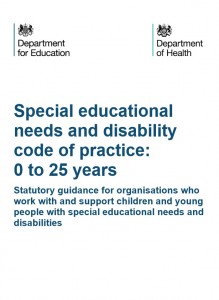As from 1st September 2014 the system for supporting children and young people with Special Educational Needs and Disabilities (SEND) is changing.
NRCSE Quality Development Adviser, Akhita Benjamin reports on the new code of practice for children with special educational needs and disabilities.
 The new SEND Code of Practice 2014 has been published by the DfE (Department for Education) and can be downloaded from https://www.gov.uk/government/publications/send-code-of-practice-0-to-25.
The new SEND Code of Practice 2014 has been published by the DfE (Department for Education) and can be downloaded from https://www.gov.uk/government/publications/send-code-of-practice-0-to-25.
There is also a useful summary of the Code of Practice for parents and carers, which you can find at https://www.gov.uk/government/publications/send-guide-for-parents-and-carers. The Code of Practice is based on 2 main areas of law – The Children and Families Act 2014 and the Equality Act 2010.
There is a great emphasis in the new system on everyone working together and sharing information, so parents and children/young people should be at the heart of every decision made and every action taken to reduce barriers to participation. Some of the major changes to the system include:-
- A Statement of Special Educational Needs will now be replaced with an Education, Health and Care (EHC) Plan and there will be a transition period to take account of those who currently have a Statement of SEN.
- Parents, young people (or their nominated representative) will be able to apply for a Personal Budget to assist with ‘buying in’ special educational provision.
- Every Local Authority must publish a “Local Offer” of provision available in their area.
- There will be a single assessment process which will lead to children and young people being given SEN support.
- Where children need high level intervention the Local Authority can be asked to make an Education, Health and Care Needs Assessment which can lead to an EHC Plan.
- There is a 20 week time limit on making an EHC Plan from the date the EHC Needs Assessment is requested.
- Support for SEND now ranges from 0-25 years and there should be a smooth transition between stages and services.
The SENCo and other professionals still play an important role in dealing with the needs of children with SEND. There is a clear expectation that mainstream schools will “use their best endeavours” to make sure children get the support they need.
Supplementary schools are not subject to these new laws but where a parent/carer seeks additional help from the supplementary school sector we should do our best to provide good quality differentiated teaching to meet the child’s needs. You will not be expected to provide for children who have high level needs, where you do not have the required expertise but we would encourage you to attend training courses, whenever possible, to gain new knowledge, skills and strategies to help children who need extra support.

Leave a Reply
You must be logged in to post a comment.